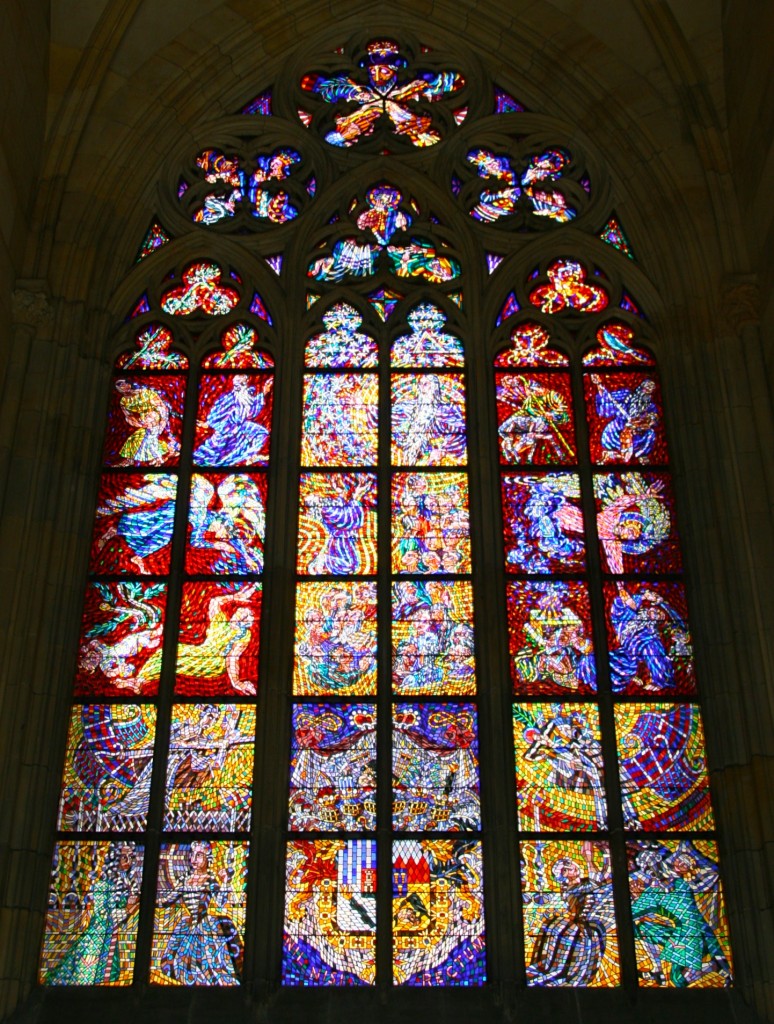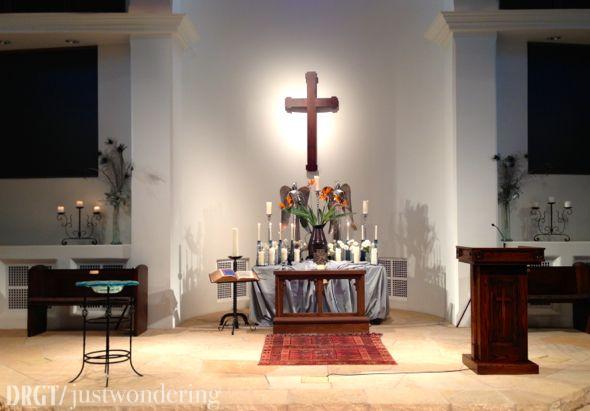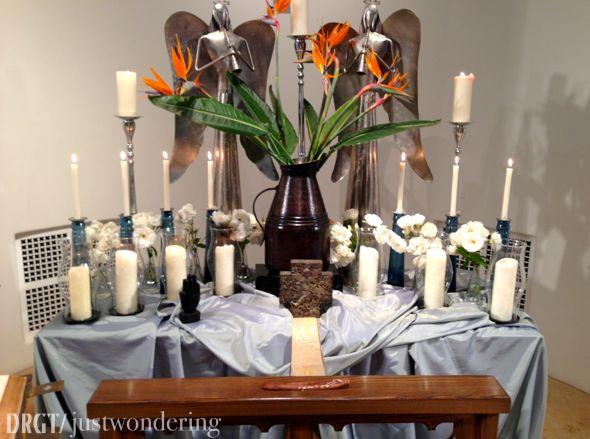I am slowly reading through a stack of old sermons, editing, deciding which I would like to place here as a record-of-sorts, primarily for my family and friends. In honor of the many years when my family attended a midweek service (now just about completely extinct!), in the middle of each week, I’ll put one up in this space. I am hopeful that remembering where the Lord has met me in the Word over these years will speak again of love and power and healing — in my own life, first, and in the lives of others as well. These posts will be longer than most and will always include reference to the text(s) of the day.
This was a sermon given at my home church, the place where I was called out to ministry, about a year after a traumatic cleaving in the congregation and a time of waiting for what might come next. I am happy to report that in the four years since that time, they have found a pastor they love and who loves them, and God is doing good things in and through them all.
“WAITING. . . “
Mark 5:21-43 with Psalm 130 and Lamentations 3:23-33
Preached at Pasadena Covenant Church, June 28, 2009
By Diana R.G. Trautwein
Two stories, one twisted within the other. Two stories, two women – one older, probably in the midst of what we today might call ‘the pause.’ One younger, just embarking on the journey to womanhood. Twelve years of bleeding, twelve years of life. All the usual resources exhausted for one, almost all hope gone for the other. Both in desperate situations. Both in need of a healing touch. Both in need of a saving touch. By the time they encounter Jesus, each of these unnamed female characters is…dead – the younger one, truly and physically dead – the older one, socially and communally dead – marked by her unceasing flow of blood as unclean, untouchable, unreachable.
One we meet in person – we watch her, sneaking up from the back of the crowd, wriggling her fingers up close to the traveling rabbi, wrapping them in just the very fringiest ends of one of the long tassels he wore. One we meet first through her father – an important man, given a name by our storyteller. A leader in his town, a man with a heightened sense of right and wrong, of clean and unclean, of all things good and righteous and holy, and all things not good, unrighteous, unholy.
Jesus and his disciples have just returned from a rather momentous journey across the Sea of Galilee, across that boundary line between the Gentile world and the Jewish world. There has been a storm, a vicious, terrifying storm – and Jesus, by the power of his word and his will, has calmed the storm.
There has been a terrifying encounter with a crazy man – living like an animal, filled with demons of all kinds. a man beyond the pale of human community, without hope, without recourse. And Jesus has met that man, met him with pity and with power – power to heal, to save, to transform.
And now, the boat is back. The disciples are back. Jesus is back. And as the little ship slaps its way up onto the sandy shore, they are surrounded by a huge crowd, an eager crowd – pushing and shoving, wondering about this wonder man, watching to see just what he will do on this side of the sea.
Striding through that crowd is the figure of an important community member, a leader in the local synagogue, Jairus, by name. And the first thing Jairus does is the last thing the demon-filled man had done – he falls at the feet of Jesus and begs him for something. The demoniac on the far shore, with the voice of the demons who had fractured him for so long, begged Jesus to cease and desist. The desperate father begs – over and over, our text tells us – for mercy, for healing, for salvation for his little girl, his much-loved daughter. And Jesus says, “Sure! I’ll come.” And they turn and head in the direction of the man’s home.
But then…
And isn’t that just exactly what so much of life is like? You’re heading in one direction quite often a really good direction, somewhere you are quite intentional about going, to do something that is a really good thing to be doing…
But then…
You’re busy raising a family, or you’re busy establishing yourself in a career, or you’re busy studying to get through school. Maybe you’re sinking your roots in a community, or fixing your home into a place of welcome and respite…
But then…you lose your job or your investment portfolio heads dramatically south, or you lose your scholarship or student grant, or your spouse becomes frighteningly ill, or your marriage begins to unravel, or…And, all of a sudden – you are seriously interrupted. You are forced to change direction. You are required to take a step back, to look at what’s happening in the moment, and to wait, to see what the outcome of it all may be.
Imagine what that waiting felt like to the leader of the synagogue. An important man, used to being treated with respect, even deference, humbling himself at the feet of a relatively unknown itinerant preacher/teacher/healer, taking immediate steps to accomplish what he had come to accomplish – and being stopped dead in his tracks by….this woman, this unclean, unwelcome, unacceptable…woman.
People pressing in on all sides, disciples skeptical of their own teacher, confusion in ascendance, and as the healer stops, turns, asks, “Who touched my clothes?” This woman – the one everyone knew was trouble to be around – this woman – the one that Jesus should have known was not worth his time, this woman – the one awestruck by what has just happened inside her own body, this woman – who dares to tell the whole truth in a culture – much like our own! – where truth is not easy to come by and is often hard to hear, this woman – stops the whole parade.
And Jairus is forced to wait, on the sidelines, out of the spotlight, his concerns for his daughter momentarily forgotten while the rabbi engages in a time-consuming, highly personal, deeply transformative conversation with this woman.
“Daughter,” he calls her. “Daughter,” folding her in with a single word. The actual physical healing takes but an instant – a momentary exchange of power. But the conversation, the truth-telling, the recognition, the inclusion, the blessing – ah, that is where the true miracle happens. And our storyteller gives us such rich detail, quiet commentary, instructive modeling as he describes it all for us.
Jairus is asked to wait – in the midst of an urgent, life-threatening situation – he is asked to wait…for a little while. But the woman…Well, the woman knew a whole lot about waiting. Twelve years worth of waiting. Waiting for doctors to be successful, waiting for the bleeding to stop, waiting for permission to rejoin her friends, her family, her worshipping community – for her symptoms required her to be on the outside of all the circles of her life.
Like so many stories of the Kingdom of God, these stories before us today are about insiders and outsiders – and about how unpredictable those definitions become when Jesus is the one doing the defining. Like the later stories of The Prodigal Son, or the Good Samaritan – the ‘usual suspects’ become the true neighbor, the party-worthy son. This woman becomes “daughter!” The leader of the synagogue becomes the man on the edge of the crowd, waiting for Jesus to continue on the way.
I can’t tell you how many times in my ministry life I have said to people in trouble, “I think that waiting is often the hardest thing that we’re ever asked to do as disciples of Jesus.” It’s tough to wait in a surgical reception area. It’s tough to wait for an addicted friend or family member to wake up and smell the recovery process. It’s tough to wait for someone you dearly love to die, and to watch them suffer while they’re dying. It’s tough to wait for decisions to be made by other people about your future, your life – whether that’s getting into the school you want, passing the course you’re struggling with, getting the job you’ve interviewed for, receiving the promotion you believe you deserve, or getting an ‘all clear’ after rigorous cancer treatment. It’s tough to wait for whatever comes next when you’re part of a congregation that’s been through a hard year. It’s tough. It’s tiring. It’s sometimes very scary and very lonely.
So, why does scripture talk about waiting so often? And why is the language of waiting so often found in the language of lament, of all places? “Out of the depths I cry to you, O Lord,” our psalm of lament for today reads. “I wait for the Lord, my soul waits…” And the reading from Lamentations says, “It is good that one should wait quietly for the salvation of the Lord.” And, “The Lord is good to those who wait for him, to the soul that seeks him.”
I am guessing that our friend Jairus didn’t think it was a good thing to wait for the Lord. To stand there, desperate for his daughter, desperate to move, to go, to get there. And I’m guessing that this woman didn’t think it was a good thing to wait twelve long years in the midst of deep isolation for someone to finally help her.
And yet….
And here are the counterbalancing two words to the “but then…” of a few minutes ago…
And yet…
Our psalm goes on to say these things: “I wait for the Lord, my soul waits, and in his word I hope; my soul waits for the Lord, more than those who watch for the morning, more than those who watch for the morning. O Israel, hope in the Lord! For with the Lord there is steadfast love, and with him is great power to redeem.”
And yet…
In waiting, there seems to be room, space…for hoping. In waiting, there is room for steadfast love. In waiting, there is space to experience the power of God to redeem – even the most difficult, the most painful, the most terrifying situations – all those hard things that seem to come right along with the territory of being human creatures who live on planet earth.
So what is there about waiting that can help create space for all of these good things? Space for hope, for steadfast love, for the power to redeem? At least one solid clue is found in the two interwoven stories in today’s gospel lesson – and that clue underscores the word of both the psalmist and the prophet in our OT readings as well. We are to wait….on the LORD. You could even change the preposition to wait ‘in’ the Lord or wait ‘with’ the Lord or wait ‘through’ the Lord, or wait ‘for’ the Lord, if that helps you wrap your mind around this concept a little more easily. The waiting talked about in the language of biblical lament, and the waiting pictured in the narrative in front of us is not the waiting experienced while standing around in the supermarket line, or sitting in the traffic lane at rush hour, or getting anywhere near the DMV office.
Both the woman and the synagogue leader waited…on the Lord. Each of them put themselves in the presence of the Savior, deliberately choosing to be near him. Each of them came to that presence, that nearness, with the concerns that weighed heaviest on their hearts, prepared to be completely honest and open about their pain and the reasons for it. Each of them came to the Savior, each of them fell at his feet, with fear and trembling…and each of them came with faith. Feeble faith – I’m sure it was at times. Magical, even superstitious faith – most probably it was at points. But faith, however feeble or unsophisticated, is welcomed by the Savior whose presence they sought. Faith, however flickering and doubt-filled it may sometimes be, is recognized by Jesus, is received by Jesus, is, in fact, seen by Jesus as a necessary and vital part of the healing, saving process. “Daughter, your faith has made you well; go in peace, and be healed of your disease,” Jesus said to the woman, after she knew in her body that healing had happened.
“Do not fear, only believe,” Jesus said to the synagogue leader when word came that his daughter was dead, while he was waiting on the Lord. There is a strange and wondrous alchemy going on here, one that I don’t begin to understand. An alchemy between the power and the willingness of Jesus to heal and to save, and the faithful obedience of the broken disciple who needs that healing, that saving. Neither the flow of blood nor the death of the daughter was a good thing – they were hard, tough, difficult things, the kinds of things that happen to people a lot. But…in the midst of each of those hard, tough, difficult things – in the midst of waiting on the Lord – they miraculously found…hope, they powerfully discovered…the steadfast love of God, they experienced…the power of redemption.
I’m not here this morning, in the midst of a place and a people whom I love deeply, to tell you that the hard things you all have experienced together in this last year are good things. They’re not – they’re hard! They cost a lot in shared pain, in doubt, in confusion and anxiety, maybe even in loss of trust and suspicion at points. You’ve been going through the ‘but then…’part, haven’t you?
But I am here to tell you today that you are, even now, in the ‘and yet…’ part. I haven’t a clue what your own individual healing or your healing as a community is going to look like, but this much I do know: it will come, it will happen. In fact, I would venture to guess that it has come and is happening – and here is the alchemist’s mystery in it all – it has come and is happening as you practice waiting on the Lord, both individually and corporately.
As you earnestly seek God’s presence, as you tell the truth, as you fall at his feet in awestruck wonder, as you take turns being in and out of the spotlight of his love and mercy, or waiting on the sidelines, as you open yourselves to the grace and mercy of God, you will find healing. Reaching right through the crowd to touch the edge of his tassel, or sitting quietly with just a few others in the bedroom of a dream or a vision that seems dead to your eyes, as you wait on the Lord – seeking his presence, offering your faith, no matter how frail it may be at any given moment in time, God is faithful. His mercies are new every morning.
“Don’t be afraid,” the rabbi will say to you. “Only believe.”
“Daughter,” our Lord will say to you, or “Son,” he will say: “Your faith has made you well. Go in peace and be healed of your disease.”
Let us pray together:
Oh, teach us to wait, Lord.
Teach us to wait on you,
for you,
with you,
through you.
By the movement of your Spirit
at work within us,
call us to yourself –alone and together.
Build in us a deep and lasting desire
to be intentionally with you.
Teach us to tell the truth,
to you and to each other.
Remind us of your glory,
that we might regularly fall at your feet,
both in awe and wonder at what you have already done in our lives,
and in acknowledgment of our ongoing need for you.
And strengthen our faith, Lord.
Strengthen our feeble knees and our faltering lips.
Teach us to trust –
to believe that in the middle of the mess –
whether it’s a new mess or one of long duration –
you are there for us
and with us.
In the name of our Savior,
who welcomes us,
even though our faith is small and tattered,
even Jesus Christ,
Amen.


































